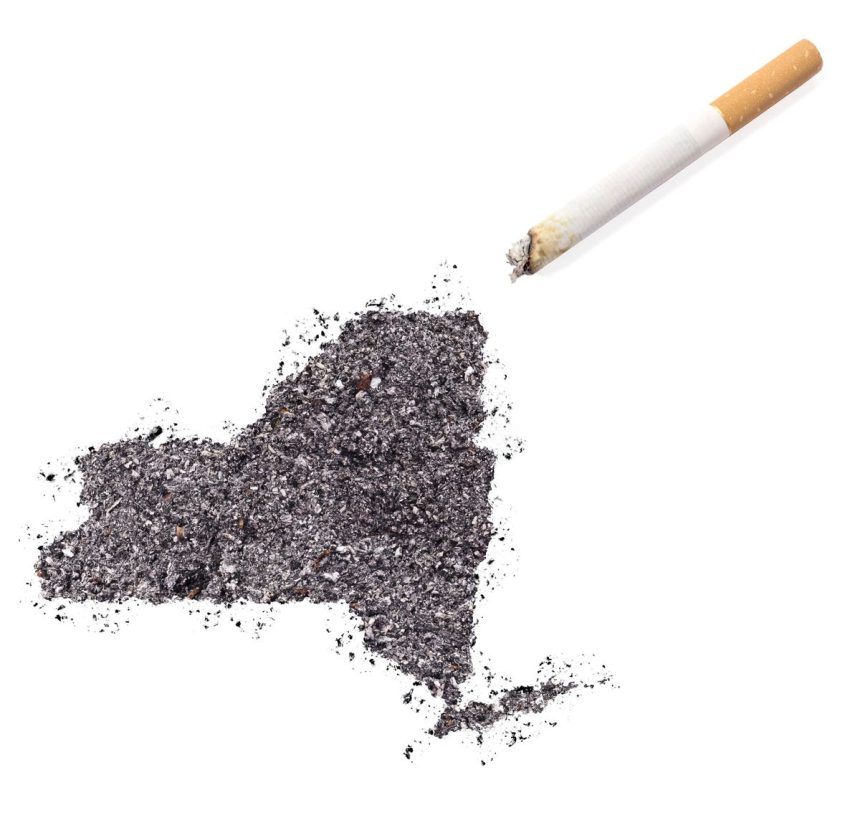In the mood for a smoke? If you’re in the Empire State, it’s going to cost you. As of September 1, New York State has the highest cigarette tax in the country. The cigarette tax has increased by $1.00 per pack of 20 cigarettes, from $4.35 to $5.35. That brings a pack of cigarettes to somewhere around $10 per pack in the state.
It will be even more expensive if you want to light up inside New York City. The tax per pack of 20 cigarettes with combined New York State and New York City taxes is $6.85—up from $5.85.
The $1 hike is the first cigarette tax increase in the state since 2010.
Federal Tobacco Taxes
The last time cigarette taxes were raised in New York is a year later than the last boost in federal tobacco taxes. The federal cigarette tax increased by a whopping $0.62 per pack in 2009. Immediately after, federal cigarette tax revenues skyrocketed, cigarette pack sales declined, and smoking among youth and adults declined. Before that, the last federal cigarette tax rate increase was in 2002.
The current federal cigarette tax is $1.01 per pack in addition to state and local taxes (some cities, like Philadelphia and New York City tack on their own taxes).
Boosting Cigarette Taxes
A 2012 analysis from the Congressional Budget Office—the federal agency that analyzes budgetary and economic issues for Congress—estimated that roughly 7% of the nation’s total annual healthcare spending at the time was attributable to smoking. The CBO hypothesized that an increase of 50 cents per pack in the federal tax on cigarettes and small cigars (adjusted for inflation) would reduce those costs and lower the federal budget deficit. The predicted drop in the federal deficit would have been about $42 billion through 2021—the end of the 10-year window for CBO’s budget estimates at the time of the analysis.
The CBO also found that a tax hike would result in fewer smokers. Specifically, they projected that the number of 12- to 17-year-olds who smoked cigarettes would be about 5% lower, the number of 18-year-old smokers would be 4.5% lower, the number of 19- to 39-year-old smokers would be almost 4% lower, and the number of smokers age 40 or older would be about 1.5% lower. The numbers at the low end of the age range are the goal: the idea is that a reduction in the number of teenage and young adult smokers would eventually translate into a lower percentage of adults who smoked.
Overall, the CBO estimates that each 1% rise in the price of cigarettes would result in roughly a 0.3% decline in the number of smokers. The total reduction in smoking could be more, they note, since research indicates that not only would a boost in tax result in fewer smokers, but also a reduction in the average number of cigarettes smoked by those who continue to use cigarettes.
The American Lung Association has also suggested that increasing the price of cigarettes, including raising taxes, would reduce tobacco use. They suggest that a 10% increase in the price of cigarettes would result in a 4% drop in adult smokers and 7% drop in kids who smoke. That’s why the organization advocates for, among other policy items, doubling the federal tax rate on cigarettes.
Numbers Nationwide
Currently, the current average state cigarette tax is $1.93 per pack. Missouri has the lowest cigarette tax in the country—just $ .17 per pack. More than half of all states have not increased their taxes on cigarettes in the last ten years. You can see how your state stacks up here.
Read the full article here






